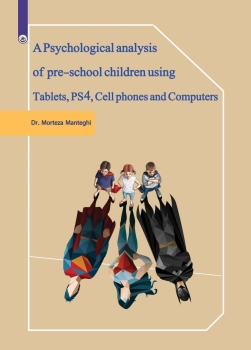کتابهای منتشره

A Psychological analysis of pre-school children using Tablets, PS4, Cell phones and Computers
The history of advanced communication technologies reveals that they have always been seen as a mixture of opportunities and threats from the beginning, and human experience in dealing with new communication technologies has led to the conclusion that the rejection and elimination of technologies is not possible. Therefore, cultural preparation is necessary to increase the positive usage of technologies and limit the negative uses.
In Iran, unlike the global experience, many cultural officials in society have taken a more cautious approach because they believe that technology usage can be adverse. As a result, they have tended to reject and deny technologies due to the aforementioned concerns. The experience of video prohibition at the first years of the Islamic revolution of 1978 and its continuation in the following years of satellite prohibition, heavy internet filtering, mobile phone prohibition in schools, and prohibition of some social networks can be understood in this context. However, it should be noted that technologies are not choices one would make and rather necessities, and in current circumstances, cultural authorities must follow the principle defending the weak against the strong by taking necessary cultural measures to increase opportunities for new communication technologies and limit their negative uses.
The perspective of rejecting technology in Iran has continued from the time the satellite issue was raised in the Islamic Council in 1994 and leaving its footprints to the present time. As a result, the field has been limited for cultural preparation to increase opportunities and reduce threats of technologies. Although there are signs such as efforts to develop a national search engine or national internet, these are positive signs. However, it should be noted that over time, because some of the needs of the community have not been met, the virtual space has become an arena for responding to the needs of different social classes, and as a result, the use of technologies in Iran has become more complex than expected.
The author, who was faced with the lack of necessary cultural preparation among technology users and saw the widespread enthusiasm of various social classes, especially children, teenagers, and young adults for new technologies, decided to investigate how children, teenagers, and young adults use advanced communication technologies and show the ups and downs of their usage. This will serve as a warning to cultural authorities and help families understand their role in monitoring their children's online activities and exercising electronic parenthood.
The present book is about investigating the psychological consequences of preschool children using new communication technologies, after presenting the recent psychological effects, with a comprehensive summary on the importance of paying attention to advanced communication technologies and the role of cultural-social institutions and educational systems in this regard.
In the book "Investigating the Psychological Effects of Using New Communication Technologies," the following topics are discussed and examined
Developing the child's individual abilities, realizing active learning and education, raising children creatively, raising children as entrepreneurs, increasing the child's self-confidence, reducing self-confidence and accepting a negative self-image, feeling double inferiority, satisfying the child's thrill-seeking, solving emotion-based problems, aggression, creating an arena for psychological discharge in cyberspace, Pushing the child towards a fantasy world, narcissism, realization of child-adult love, nervous conflict, fear, anxiety, depression, sleep disorders, anorexia, bedwetting, tics, feelings of physical deformity, early entry into the field of pornography, prediction of precocious puberty, child abuse, dependence and addiction to tablets, PS4s and mobile phones, the harms of growing up in cyberspace, threats to children's mental health and other psychological consequences.
In the final chapter, under the title Reflection, it is emphasized that new communication technologies are a combination of opportunities and threats, and that we must use human experience in the West to face these opportunities and threats, while avoiding procrastination, which would lead to waste of opportunities. Instead, children in this region are faced with threats and suffer from various physical, emotional, psychological, cultural, social, economic, and ideological harm.
Key Words of the book:
Child, per-school, developing the child's individual abilities, creativity, raising children as entrepreneurs, increasing the child's self-confidence, reducing self-confidence, satisfying the child's thrill-seeking, aggression, psychological discharge, Pushing towards a fantasy world, narcissism, realization of child-adult love, nervous conflict, fear, anxiety, depression, sleep disorders, anorexia, bedwetting, tics, feelings of physical deformity, pornography, prediction of precocious puberty, child abuse, dependence and addiction to tablets, PS4s, mobile phones, the harms of growing up in cyberspace, threats to children's mental health.